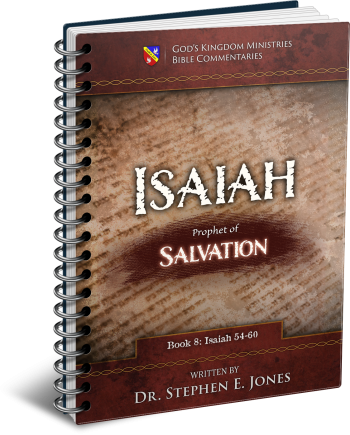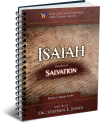Latest Posts
View the latest posts in an easy-to-read list format, with filtering options.

Isaiah is the prophet of Salvation. He is also known as the truly "Universalist" prophet, by which is meant that He makes it clear that salvation is extended equally to all nations and not just to Israel. He lived to see the fall of Israel and the deportation of the Israelites to Assyria, and he prophesied of their "return" to God (through repentance). He is truly a "major prophet" whose prophecies greatly influenced the Apostle Paul in the New Testament.
Category - Bible Commentaries

Isaiah 60:10, 11 says,
10 Foreigners will build up your walls, and their kings will minister to you; for in My wrath I struck you, and in My favor I have had compassion on you. 11 Your gates will be open continually; they will not be closed day or night, so that men may bring to you the wealth of the nations.
The prophet continues to press the great truth that the House of God is “for all the peoples” (Isaiah 56:7)—foreigners as well as Israelites. In spite of the prophet’s continual emphasis on the New Covenant, however, many people continue to interpret this through Old Covenant eyes. They picture foreigners as slaves having their wealth confiscated by Israelite overlords. They distinguish the people by race, rather than by faith. They see a physical temple, rather than interpreting it according to Rev. 21:22,
22 I saw no temple in it, for the Lord God the Almighty and the Lamb are its temple.
Speaking of the New Jerusalem, Isaiah speaks directly to the city itself, saying, “foreigners will build up your walls.” Again, the prophet says, “Your gates will be open continually.” When God speaks, something immediately comes into existence, even if it takes thousands of years for it to manifest in the earth.
Every word of God sets into motion that which will be when heaven is fully manifested in the earth. The difference between that which is in heaven and the completion of its earthly counterpart is called Time. Time allows the process from existence to manifestation. In the interim is something called imputation, defined in Rom. 4:17.
God has been building a city since the beginning of time. By faith, Abraham looked for that city, whose Builder is God (Heb. 11:10). Isaiah says that foreigners will build its walls. Is there a contradiction? No, for we are all co-laborers with God, and foreigners participate in this great building project as well.
John tells us that this great “city” will have gates that will never be closed (Rev. 21:25) and that the nations and kings of the earth will bring their glory and honor into it (Rev. 21:26). John goes further by telling us that no unclean person will enter this city. Rev. 21:27 says,
27 and nothing unclean, and no one who practices abomination [i.e., idolatry] and lying shall ever come into it, but only those whose names are written in the Lamb’s book of life.
The foreigners who are called to build the walls of this city are neither idolaters nor unbelievers of any variety. They build because they have faith in the “wise Master Builder” (1 Cor. 3:10). They are in agreement with His work, even as we today agree with Him in building the Kingdom of God. When we were in a state of unbelief, we too were foreigners and aliens, excluded from “the commonwealth of Israel” (Eph. 2:12). We join the commonwealth of Israel by faith in Christ, and because of this “our citizenship is in heaven” (Phil. 3:20). Furthermore, by faith in His word we have been cleansed (John 15:3).
Hence, Isaiah’s prophecy is not meant to teach that those who cannot trace their lineage back to Abraham, Isaac, and Jacob are destined to serve as slaves in the Kingdom. Slavery is a fundamental feature of the Old Covenant. That is why it is represented allegorically by the bondwoman (Gal. 4:24, 25). If we think that God wants slaves, we have yet to understand the New Covenant.
Slavery was never meant to be a permanent condition. Biblical slavery was based on the judicial principle that sinners are debtors who must labor to pay their debt. Yet in the end, the law of Jubilee cancels all debt and sets the captives free.
Isaiah 60:10 was meant to picture foreigners hearing the word and desiring to join those who build the heavenly city as it emerges in the earthly realm. To labor for the Kingdom does not require being a slave. Slaves labor against their will. Free men labor because they want to build a better world as defined by the word of God. Though Isaiah does not define the type of labor in this particular verse, it is interpreted and clarified in the New Testament through New Covenant eyes.
It is also noteworthy that kings and nations will continue to exist in the time when the New Jerusalem comes to the earth. Those who come to “Zion” to learn the law of the Lord (Isaiah 2:3) will become part of God’s Universal Empire and bow to King Jesus. Some will remain temporarily in outer darkness until the White Throne judgment (Rev. 20:7, 8), where, at last, every knee will bow.
Christ is called “King of Kings” (Rev. 17:14). The title indicates that there must be “kings” who are subservient to the “King.” Every king must have a nation to rule, otherwise he is not a king. Hence, nations and kings will continue to exist until the restoration of all things, at which time such national boundaries and earthly authorities will no longer be relevant.
Isaiah 60:12 says,
12 For the nation and the kingdom which will not serve you will perish, and the nations will be utterly ruined.
The reference to “your walls” (vs. 10) and “your gates” (vs. 11) provides the context for verse 12. The prophetic word in this passage was addressed to the heavenly city. Hence, we should read this to mean that the nation and kingdom which will not submit to the heavenly Jerusalem and its King “will perish” and “be utterly ruined.”
Many nations will indeed serve Christ and His capital city, New Jerusalem. But yet in Rev. 20:7-9 we find that even after a thousand years of Christ’s rule, there will still be some nations who refuse to join God’s Universal Empire. Christ will not force them to submit, for that is not His way of doing things. He wins their loyalty by His demonstration of love and by showing how His government brings prosperity, freedom, and happiness.
Hence, toward the end of the thousand years of peace, Satan is loosed, knowing that he will induce those remaining nations to attack the Kingdom. The attack gives God legal cause to conquer them by force. This is a tactic that God used in the story of Samson, where God induced him to fall in love with a Philistine woman in order to judge the Philistines. We read in Judges 14:4,
4 However, his father and mother did not know that it was of the Lord; for He was seeking an occasion against the Philistines…
We see here how God did not simply tell Samson (or Israel) to make war on the Philistines. He needed lawful cause. So He caused Samson to fall in love with the Philistine woman. I believe her name was Eglah, “heifer,” as this is what he called her in Judges 14:18. Compare her name with Rachel, “ewe,” and Leah, “cow.” (See also my novel, Power of the Flame, which shows how Eglah prophetically represents the red heifer in Num. 19:2.)
The point is that in Rev. 20:7 we read that the divine plan is to induce the remaining nations to attack God’s Universal Empire, so that Christ obtains lawful cause to take over their territory. Isaiah says that these nations “will be utterly ruined.” In other words, their name and status as independent nations will cease to exist.
Nonetheless, if there are survivors, they will be taken captive and will be subjected to the authority of Christ. Once He gains power over the entire earth, the stage is set for the final judgment, where all of the dead since the beginning of time are raised and summoned to the divine court.
That is the moment in history where every knee will bow and where every tongue with “swear allegiance” (Isaiah 45:23). Paul interpreted it to say that “every tongue will confess that Jesus Christ is Lord” (Phil. 2:11). To confess is to profess (exomologeo) Christ, that is, to swear allegiance to Christ by declaring Him to be “Lord.”
Isaiah 60:13 continues,
13 The glory of Lebanon will come to you, the juniper, the box tree, and the cypress together, to beautify the place of My sanctuary; and I shall make the place of My feet glorious.
These literal trees were used in the construction of Solomon’s temple. They become metaphors of the “living stones” (1 Peter 2:5) that make up the spiritual temple that is built upon the foundation of Christ and the apostles (Eph. 2:20-22). In Rev. 3:12, the overcomers themselves are said to be “a pillar in the temple of My God.”
In the same manner, the cedars of Lebanon, the juniper, and the box tree represent people—foreigners in particular—who are being built into the temple of God. (See 2 Chron. 2:8.) The cedars were from Lebanon, a foreign country, and there were 153,600 foreign laborers (2 Chron. 2:17). The number 153 is the biblical number representing the sons of God, and 600 is the number of the cosmos, or “world.”
Solomon’s temple set the prophetic pattern for the greater temple under the New Covenant. The trees from Lebanon were metaphors of foreign people, the number 153 prophesies of the sons of God, and the number 600 prophesies that this is a world-wide project. Isaiah links Solomon’s temple to the New Covenant temple that God was to build. He beautifies His temple with people of all races and nations.
Isaiah 60:14 says,
14 The sons of those who afflicted you will come bowing to you, and all those who despised you will bow themselves at the soles of your feet; and they will call you the city of the Lord, the Zion of the Holy One of Israel.
Once again, “you” is the New Jerusalem, the heavenly city. It is not a physical city as such. Its building materials are righteous principles and righteous people. Those who had formerly “afflicted you” will reverse their course. The martyrs from all ages will be vindicated when the Spirit of repentance is poured out. Those who despised the believers will bow to them, asking forgiveness for their past abuse.
The nations who had been in a state of rebellion against Christ and His people will then recognize believers as “the city of the Lord” and as “Zion,” the seat of Kingdom government. Those who overcome and who inherit immortality in “the first resurrection… will be priests of God and of Christ and will reign with Him for a thousand years (Rev. 20:6). Their “reign” will be according to their level of spiritual authority and calling.